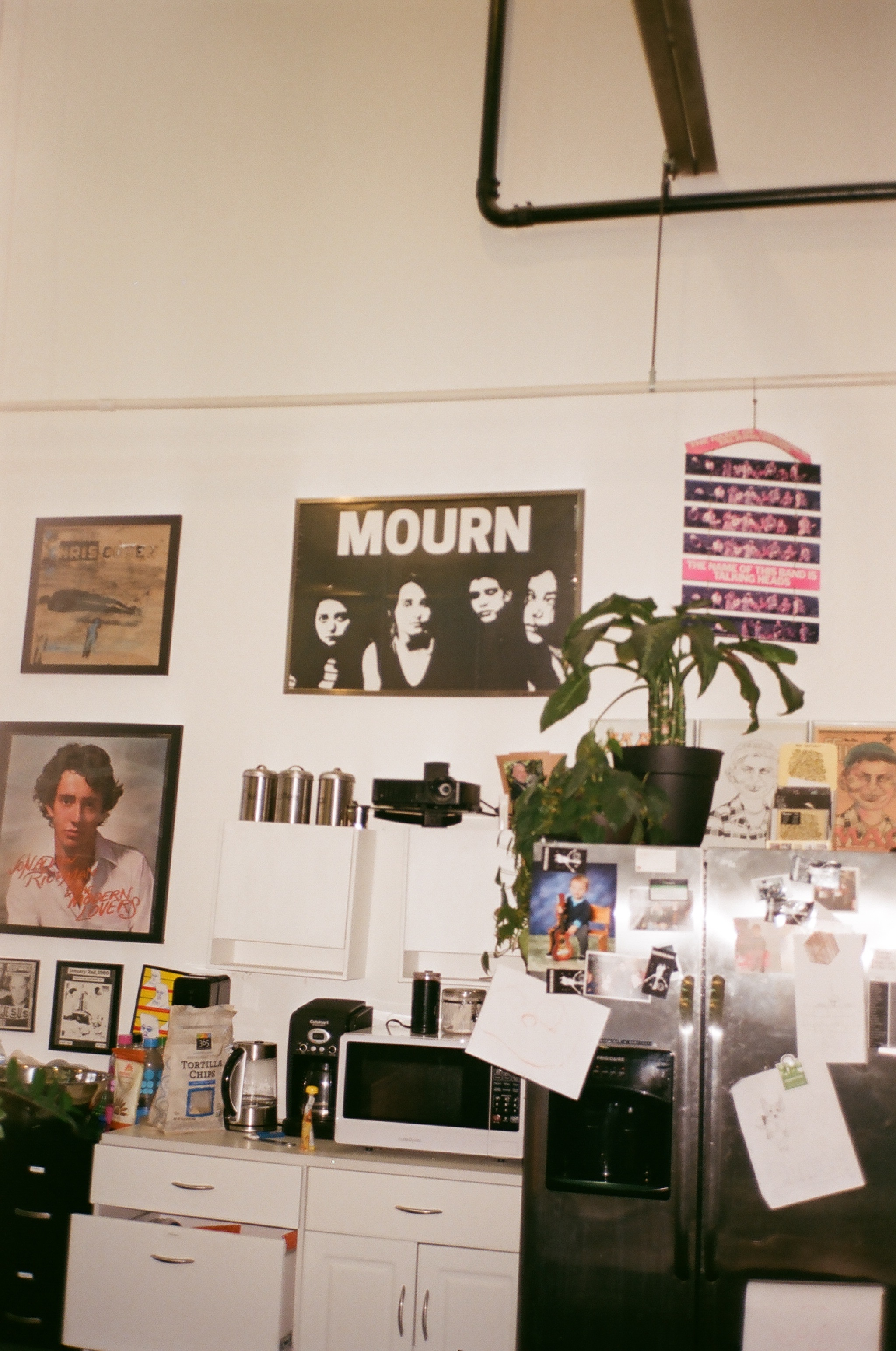Photos by Nazar Khamis.
MOURN released their third album, Sopressa Familia, earlier this summer. Almost the entire album speaks to their really shitty experience with a past record label at very tender ages—or it seems to, at least.
I caught up with them at a restaurant shrouded in pastel pinks, with tables covered in random trinkets from the sea, vintage bookstores, and overpriced decor stores on Bedford Avenue. They were the only ones, or one of the only ones, in the restaurant on a weekday afternoon, sitting at one of the long, pink tables with scraps of toast and heirloom tomatoes on their plates. They were speaking quietly amongst themselves when I walked in, but they immediately welcomed me to their table of twigs and twine to answer my questions.
The four of them all got reasonably emotional at one point or another during our time chatting, and it only added to the respect I hold for these young musicians and what they are contributing to the world and to their specific community. It’s clear that their success has been birthed from authenticity, passion, loyalty to each other, and the pure magic of their talent.
In the past, you seemed a little reluctant to talk about the whole ordeal with the past label and stuff. When did you know that you wanted to write a full 12-track album about it?
Jazz Rodríguez Bueno: It was almost completely about this. But the thing is that we had to remain silent, in Spain at least, if we talked, we would have had more trouble. People were threatening to sue us and all that stuff. We were just on pause. We couldn’t play, we couldn’t release any music, we couldn’t speak about it. It was a very strange situation where we couldn’t move. During all this, we had to take it out some way, so we started writing about it because we always write about personal stuff. There was not an intention of doing a whole album about it—we joked about it, but it was not on purpose.
Do you remember what the first song or one of the first songs that came out about it?
Jazz: It was “Divorce.” During all that shade, we were writing the lyrics so they were written in the moment. So the lyrics are what we felt in that exact moment. It was during moments on the bus, just thinking about it and feeling like [sharp inhale], so you have to write it on the phone or something like that.
In kind of a sadistic way, do you think you’re, in a strange way, maybe a little it grateful that you had so much passion about something to write such a fresh album about it?
Jazz: I don’t know. I don’t think so, because it was a huge wait. Now I feel great because it’s all gone, and it turned [into] this album which I love. I feel very comfortable with it. So at least we got something positive out of it and now maybe I can think about how, yeah, maybe that was a life lesson that I had to live through. I feel like I have more tools to confront situations like that.
Carla Pérez Vas: But we wouldn’t like to live it again [just] to have another good album.
Are there people who actually comprise your surprise family? Are there specific people or is that just more of an idea?
Jazz: Yeah, I think the surprise family is the four of us, and then our parents. Our parents helped us a lot with this and they gave us their full support the whole time. I think they made us be even closer now.
Between the four of you, if you were to assign family roles to you as you function in the band, who would be what and do you think you fall into those roles easily?
Jazz: I think we switch, but I would say that Antonio is the baby. I mean, we all take care of everyone. But sometimes Carla is like, “I feel like the mom.”
Carla: Yeah, I’ve actually said a few times! I think it’s because I care about all my friends a lot in a really deep way.
Jazz: I think we are all siblings. But yes, sometimes Carla is like the mom, like, “are you okay?” Caring about us all the time.
Is ritual important to you when you perform live? Do you have any superstitions or anything like that when you perform?
Jazz: Not superstitious, but we have this song we sing together before going on stage. We make a circle and sing together.
So you don’t believe in superstition, but do you think that luck has a lot to do with the success of a band or do you think it’s all hard work and experience. Or, do you think it’s a little bit of both? So many of the early punk bands weren’t that experienced but there was just kind of like this magic about them. Do you feel like that kind of thing is still important with your music and in modern music?
Jazz: I don’t know. I don’t like to think that it’s because of luck because I feel like it can go [snaps fingers] like this, and I feel like I need some control. I would say I know there’s something there, but, I don’t know. It’s weird.
Antonio Postius Echeverría: Yeah, me neither. Our music and our albums are the results of all the really hard work we are putting in. But I think we got this extra luck to be in this environment, to have this team and access to different countries. I think that’s the mix between the music which is totally hard work, but we had the luck to have access to all of this, to a big team.
And I feel like you guys must just click with each other so I guess there’s that piece of luck for finding each other. Do you think it’s even possible to be original anymore? What does it mean to you guys to be original? Is it something you consciously think about?
Carla: I think that it relates a lot to being honest. I think it goes together.
Antonio: If you center your attention on what’s going on, what’s trendy… you become less yourself because you realize that what people listen to the most [already] stands as it is.
Jazz: I think it’s what Carla said. It’s important to be honest in what you do and to try not to be somebody else. You don’t need to be 100% confident in what you’re doing, but you have to feel sure of it[‘s truthfulness.] It’s something I’ve been thinking about – are you original on purpose, or does it just happen to you? And I think it’s the second one.
So you think that authenticity is super important to even connect with any kind of art or music?
Jazz: Yeah, like I think people can feel that you know?
For sure, and speaking of what people feel – both of the videos that you’ve released so far for this album have felt really lighthearted. How important is it for you guys to have a sense of humor about yourselves? In art in general, do you think it’s important to have a sense of humor?
Antonio: I think that if you take yourself seriously, you’re gonna work serious. But if you take yourself too seriously you’re pretty much done with everything, cause you can’t expect anything [else].
Carla: I think the album talks about something really fucked up and serious, so humor the only way to not make it like a bigger thing. If you’re sarcastic or ironic about it, it’s just easier.
Jazz: And we’re always joking, I mean we’re not serious people at all.
So there was a quote in an interview a while ago where you had said something very serious like, “Oh, everything in Spain is terrible.” It might have totally been taken out of context, but how important is it to your identity as a band and as people to be from Catalonia and be a band from there?
Carla: If I said that, what I meant is that related to politics. I think the place is amazing, the food is beautiful.
Antonio: Socially and politically, it’s in deep shit right now. And a lot of it’s in shambles.
Jazz: Being from Catalonia has influenced our music. Not directly, but because you’re in constant frustration, you turn on the TV and you see that shit and you’re like, “again?” Every time’s the same and Catalonia has a history rooted in this. Our language was prohibited, we were treated like shit – we were invaded by Spain at some point. I think Catalan culture is a whole different thing and it’s important to us. It’s our culture, you know?
Antonio: We have opinions about it, but it’s not like we bring our music into it. We can [express] frustrations from this in our music but it’s not a trademark. We don’t go with any flak from anywhere, from our country or from any other country. But it is influential in our lifestyle and our social environment, and everything else.
Jazz: But we’ve lived Catalan culture more than Spanish culture. We obviously have Spanish influence in our lives, and it’s positive as well because we have a lot of Spanish family.
Antonio: I’m half Mexican, I mean… I don’t take [ownership of] any place because I feel like I’m a person from the world.
I ask because the US obviously is not doing very well politically right now either, so a lot of bands have been directly going off that very specifically, and obviously speaking to that. Have you noticed bands from your area taking that same approach?
Antonio: In Spain actually the style now that has a lot of problems with that has been Spanish hip-hop, which has turned into a Spanish rapper going to jail for three years just for stating an opinion. A Mallorcan, sorry, North Spanish. A Mallorcan rapper. There are also two rappers from Sevilla who almost went to jail, or they were fined for expressing political opinions. I think also there was also a punk singer who got into a lot of trouble with the police at a festival. That’s one of the biggest problems in Catalonia. It’s under a lot of oppression from Spain.
Carla: So, of course, it’s connected. I think that everywhere in the world, everyone is more aware of the political and social bullshit that is happening in the world because now we have it everywhere in the social media and TV. But I think there’s gonna be lots of musicians coming in just talking about that, those issues, I think.
Jazz: A lot of rappers united and made a song talking shit about the crown, and I don’t really like that kind of music but when I see it I feel very excited. And I think people are trying to unite in this way.
Antonio: Right now in Catalonia especially, for some reason rap music has always been the most outspoken about this. But indie musicians, rock musicians, and punk musicians are starting to retaliate against that, and are actually starting to have problems with the law too.
In the midst of all of the politics and label struggles, have you ever found yourself in a situation where you just didn’t even want to create anymore?
Jazz: Yeah, especially in the past year. In the beginning, I wanted to keep up with this with these people and keep going, but it was a two-year process. At the end, I wanted to quit. I was telling my boyfriend, “I want this to be over. I don’t want to make more music, I don’t want to have a band. Maybe start something different years later.” And I felt like quitting it. But when I thought about them, [gestures to the band] and I thought…
Carla: Don’t say this cause I’m gonna cry.
Jazz: No! But I felt like together we could get out of this shit. So I didn’t want to just end it because I couldn’t stand it anymore. I had to continue for them, you know?
Antonio: There were low points, you know? I was really young when the band started. We were all really young. I was about to quit music ‘cause nothing was really amounting to [anything]. Then we kinda like blew up – our label blew us up, and then we got out there and everything got strange. I had to think about whether or not all this shit is gonna make me want to quit again? Shit, it almost happened. Now [that experience] is never going away, you know? Cause now [the band] came back. It’s a really emotional topic. We’ve been through a lot of shit.
After all of that, can you ever imagine yourselves going back to a “normal life?” Are some of you guys are in school?
Antonio: No, no. I dropped out when I was fourteen. It wasn’t really for me.
Carla: Me neither.
Jazz: I sometimes thought, it would be easier for me if I just had a normal job, if I studied and got a normal job. But I don’t really know if I would be happy. Like, this happy.
Carla: I think right now maybe not, but you never know. When I’m 50 or 40, I might just wanna do ceramics and have a ceramics shop.
Jazz: Yeah actually her town is known because of their ceramics.
Carla: Argentona. It’s like Argentina but with an “o.”
Well, one other thing I know you do is making music videos with other bands. Do you find that working with other bands kind of flips something on in yourself to see things from a different angle?
Jazz: Yeah, totally. It helps to know people who are in a similar situation. During all the time we weren’t able to play, we went to see shows. We’ve stayed friends with all the bands that were close. I think that was important because outside your own music, you still have connections with all the music scenes.
Do you think it’s also important for bands to be more aware of the people that are listening to them?
Antonio: Totally.
Jazz: If somebody has texted you or said something on social media, it’s because they want to know more about you and I think it’s important to answer and keep up. We met my best friend in America, my only friend in America [that way].
Antonio: If we see the people that listen to us as fans, as worshippers, or as dollar signs, it’s really the end of that relationship between us and people who feel things with us. When someone tells us, “your music has helped me go through this or that,” they’re not a follower, they’re a person who feels this shit. So the people who come to the shows are the people who embrace something with us.
That comes back to being really honest and authentic with everybody and everything.
Carla: We are all human. We like music and they like music, and [when] it turns out that it’s our songs… it should be a really normal relationship with the people that come to our shows.
You’re on the same level.
Carla: Yeah, we are, cause they probably are musicians as well.
Jazz: And they are supporting us, and that’s always good.
Carla: So yeah, artists should keep that connection with the people who, at the end of the day, are listening to the music.
A lot of people connect to a band because of their look. Do you think it’s possible to not have a look when you’re a band? Even if you’re trying to not have that be a part of who you are, do you think it’s possible to go under the radar and not have a look or aesthetic?
Carla: I don’t know, sometimes we do these things with bands – we put them on this pedestal. We say, “oh they’re wearing white and black stripes. That’s so iconic, that’s so cool, that’s so whatever.” And at the end of the day, it’s just like, a shirt. I think it’s important but it’s not who we are.
Are you guys familiar with synesthesia? Where you hear a note and you see a color? If this album were to taste or smell like something or be a color, does anything come to mind?
Antonio: For me, it would be a mix between red for the rage of the album, and maybe blue or yellow for the light that came out of it.
Jazz: It’s like a fruit salad, but with something acidic or bitter. I would like to know if “Orange,” the song, is actually orange. I’m curious about it.
Antonio: Find someone who has that.















